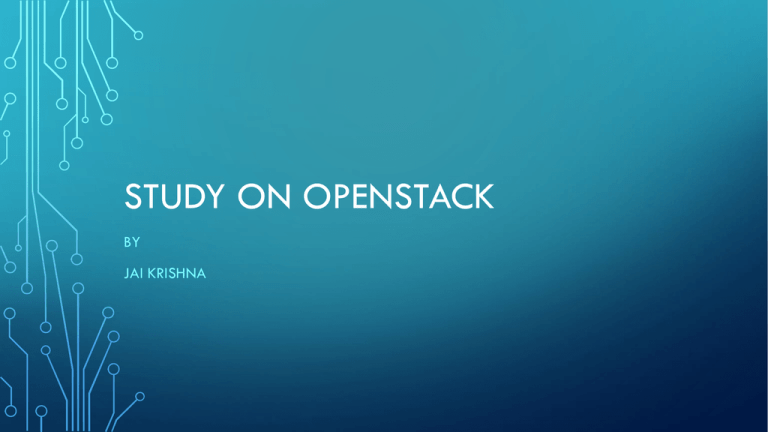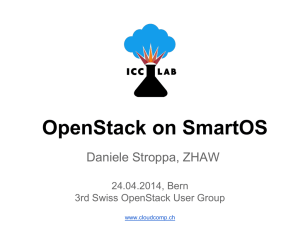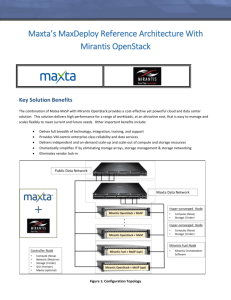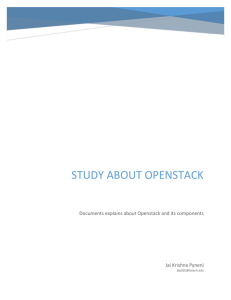Openstack
advertisement

STUDY ON OPENSTACK BY JAI KRISHNA LIST OF COMPONENTS • Introduction • Components • Architecture • Where it is used WHAT IS OPENSTACK • OpenStack is a cloud operating system that controls large pools of compute, storage, and networking resources throughout a datacenter with a dashboard. COMPONENTS Basic building Components are • Compute (Nova) • Object Storage (Swift) • Block Storage (Cinder) • Networking (Neutron) • Dashboard (Horizon) COMPONENTS(CONT.) Apart from above there are some Shared Components a. Identity Service (Keystone) b. Image Service (Glance) c. Telemetry (Ceilometer) d. Orchestration (Heat) COMPUTE (NOVA) • Provision and manages large networks of virtual machines COMPUTE (NOVA ) •Base image state with no running instances • Instance creation from image and run time state 7 STORAGE Object Storage: Object Storage provides a fully distributed, API-accessible storage platform that can be integrated directly into applications or used for backup, archiving and data retention. Block Storage: Block Storage allows block of storages to be exposed and connected to compute instances for expanded storage, better performance and integration with enterprise storage platforms NETWORKING(NEURON) • Neutron is an OpenStack project to provide "networking as a service" between interface devices. DASHBOARD (HORIZON) • Dashboard provides a web based user interface to OpenStack services including Nova, Swift, Keystone, etc. • The OpenStack dashboard provides administrators and users a graphical interface to access, provision and automate cloud-based resources. SAMPLE DASHBOARD IDENTITY SERVICE (KEYSTONE) • Keystone is the identity service used by OpenStack for authentication (authN) and high-level authorization (authZ). • It currently supports token-based authN and user-service authorization. IMAGE SERVICE (GLANCE) • The OpenStack Image Service provides discovery, registration and delivery services for disk and server images TELEMETRY (CEILOMETER) • The OpenStack Telemetry service aggregates usage and performance data across the services deployed in an OpenStack cloud. ORCHESTRATION (HEAT) • OpenStack Heat program is to create a human- and machine-accessible service for managing the entire lifecycle of infrastructure and applications within OpenStack clouds. ARCHITECTURE CONCEPTUAL ARCHITECTURE RELEASE HISTORY OF OPENSTACK Release name Release date Included Component code names Austin 21 October 2010 Nova, Swift Bexar 3 February 2011 Nova, Glance, Swift Cactus 15 April 2011 Nova, Glance, Swift Diablo 22 September 2011 Nova, Glance, Swift Essex 5 April 2012 Nova, Glance, Swift, Horizon, Keystone Folsom 27 September 2012 Nova, Glance, Swift, Horizon, Keystone, Quantum, Cinder Grizzly 4 April 2013 Nova, Glance, Swift, Horizon, Keystone, Quantum, Cinder Havana 17 October 2013 Nova, Glance, Swift, Horizon, Keystone, Neutron, Cinder, Heat, Ceilometer Icehouse 17 April 2014 Nova, Glance, Swift, Horizon, Keystone, Neutron, Cinder, Heat, Ceilometer, Trove SMALL COMPARISON S.No OpenStack Service Amazon Service 1 Compute (Nova) Amazon EC2 2 Object Storage (Swift) Amazon S3 3 Database (Trove) Amazon RDS 4 Block Storage (Cinder) Amazon EBS 5 Network (Neuron) Amazon VPC USE CASES OF OPENSTACK: • IaaS compute platform • Processing big data with tools like Hadoop • Scaling compute up and down to meet demand for web resources and applications • High-performance computing (HPC) environments processing diverse and intensive workloads • Different users of OpenStack are AT&T, HP cloud services, PayPal, Rackspace, Sony online gaming systems, Yahoo, Wikimedia labs, Intel, NASA etc... REFERENCES • http://www.openstack.org/ • http://docs.openstack.org/ • https://wiki.openstack.org/wiki/Main_Page • http://en.wikipedia.org/wiki/OpenStack











